#that’s when he adheres to Batman’s rule
Explore tagged Tumblr posts
Text
Danny Fenton goon union representative (dp x dc fanfic prompt)
At no point in Danny's life has he ever turned down a challenge, even when he had to deal with opponents bigger than himself. From dealing with everyone from Dash to Vlad to heck pariah dark, he's learned to take down people bigger than himself. So when he overhears that his nice father of four neighbors has been having some trouble at work and has been unable to get some time off, he figures it can't hurt to try to help such a nice guy out. And it does go ok, all things considered; I mean, what if the guy's boss was the penguin, and so what if Danny maybe had to show off some of his less-than-human characteristics to get him to agree to let the guy have some time off? Everything worked out at the end of who cares.
Well, when word gets out that someone is not afraid to go tow to tow with the city's villains, someone's bound to either take him out or hire him. And when word gets around that he's willing to help get better working conditions for Gotham's goon workers, their union could use a new representative.
So Danny inadvertently gets a new job, wherein he gets to meet many strange characters around the city and help many friendly working-class people with their problems. Interchange the goons help hide Danny from the bat, and his no meta-rule, even if Danny doesn't know they're hiding him. But this does cause some problems because people like black mask don't necessarily want to pay for their goon's vision care or overtime and refuses to adhere to any of the union's demands. Danny, for what it's worth, did warn the guy because, unlike black mask, he has the goon's respect and knows that they will listen to him, so when he proposes a strike, they readily agree to his suggestion.
And with all of this going down so quickly in the city, both batman and the red hood need to get as much info on this new player before things get even more out of hand. But with all of the normal underground information channels refusing to give them anything, they are forced to schedule a meeting with not only the union but its infamous leader, which is good for Danny because he wasn't sure how to get into contact with batman anyway. He has some concerns with the level of violence used to take down some goons. And well, when they have no choice but to work in this industry, they should, at the very least, outline a clear code of conduct for all parties involved to ensure the safest possible work environment.
#danny phantom#danny phantom crossover#dc x dp#dp crossover#dp dc crossover#dp prompt#dp fanfic#dc x dp prompt#batman#red hood#black mask#my man fights for the little guy#eldritch danny#who cares if he might not be human he helped Phill get dental added to the list of benefits#fanfiction prompts#dcu prompts
3K notes
·
View notes
Note
Slightly dark/insane batfam who is overjoyed to have Jason back from death is one of my favorite aus ever. Like imagine Bruce being oh so proud of his son who ended entire gangs and built an empire in a matter of months before he even turned 19. Ofc he's gonna brag to this fellow JL members. His kid is just so driven and smart! Jason has no idea if they were always like this or if his death made them this way but he's not complaining (much).
Ooo that would be interesting!
Like, a Batman who still doesn’t kill and adheres to his moral code but has absolutely no problem if his kids turn murderous. He’s a proud and supportive dad either way, the only rule he has is that they keep it strictly to criminals and leave alone the regular civilians.
He went a little cuckoo when he lost Jason. As did Dick. (And Tim wasn’t sane either way lmao)
#Tim is my little chaos gremlin#Steph isn’t any better#cass is an angel ✨#duke would like to mention that he’s very scared of them all#but still loves them#Damian is pleasantly surprised by his father’s moral flexibilities#but he decides to take the no killing thing as a challenge#the JLA don’t know what kind of shit show they stepped into but they’re glad someone’s handling Gotham#they know the day Bats kills someone is the day the need to evacuate earth lmao#ghost talks#batfamily#jason todd#dick grayson#batfam#robin#bruce wayne#red hood#tim drake#batman#duke thonas#cassandra cain#Stephanie brown#Damian wayne
439 notes
·
View notes
Text
a summer is sold
[part six of my fae!Tim AU. masterpost here]
~
Bruce returns to the Unseelie Queen. He steps through the fae circle with the trusty protections of salt and iron. It is quite unlike Batman to use tools that are so low-tech, but he will not deny the efficacy of that which has protected humankind from the fae for thousands of years.
“Unseelie Queen!” Bruce shouts. Last time the forest of mushrooms simply melted into a clearing where he placed his protections and conducted his business. Today, the poisonously red caps simply grow and grow until the mushrooms tower over him.
The smell of organic matter decaying and a swirl of turquoise leaves. She arrives in her usual fashion. Ten feet tall and dressed in a gown of rushing rivers and starlit nights. A gray face and the smile of nightmares. The Unseelie Queen attempts of human beauty and misses in a manner so violently unsettling, so uncanny-valley-upsetting, that even Batman feels fear.
“I have come to make a new deal.” Bruce shows no fear. Rule number one.
“Oh?” The Unseelie Queen bends down until her back splits in four places and they are eye to eye. Screams dance madly in her silver-violet-smoke black eyes until Bruce drops his gaze to her chin. “Do you wish for me to take back my gift?”
Not Jason. It is love that pangs around Bruce’s heart, love that morphs into fear when she threatens Jason’s life out of curiosity.
“You overreached,” Bruce accuses. He will not acknowledge her threat. Rule number two: admit to no emotion but rage. “You made a deal with Tim for humanity. If he fails, he leaves.”
This is once again educated guesswork on Bruce’s part. He’s still not sure what the Unseelie Queen is getting out of all of this. But Tim clearly wants to stay in the human realm. How else to punish him but to make him leave?
“If he leaves, you’ve failed your bargain with me,” Bruce continues.
The Unseelie Queen gnashes row after row of teeth to dust until her frustration works itself out. “You cannot make a deal on his behalf.”
“And you can?”
Bruce’s bargain with her depended, from the very beginning, on her right to bargain Tim away. He had believed, when she first handed Tim over, that Tim was a subject of the fae, a member of the Unseelie Court, and therefore hers to do what she liked with. A loyal subject. A spy meant to serve as the Unseelie Queen’s hand in a realm she could not otherwise reach.
But Tim delights in the cuisine explorations Dick and Jason take him to. He soaks up Barbara’s computer crash courses, which is quite unusual for a fae; they are notoriously tech-averse. He yearns to be human. If there is any chance that Tim truly wants to turn away from the Unseelie Queen, then it is the morally right thing to do to keep him away from her. Batman has offered hand after hand to the most irredeemable villains; what is one more to a strange little creature who may still be a child by the standards of the fae?
Moreover, it is in Bruce’s and his family’s own best interest to expedite Tim’s process of becoming human. If Tim’s deal with the Unseelie Queen doesn’t work, he may attempt to become human by eating one, or by stealing the skin of one, or whatever else a fae’s mind might think up. Suppose, even, that the Unseelie Queen has no jurisdiction over the humanity of her subjects. It made sense to Bruce that she could de-fae whoever displeased her, but he knows now that she makes promises vastly out of her reach. Perhaps she has no humanity to offer Tim. Then it is still in Bruce’s best interest to keep Tim away from her and teach him the morality of humans.
“Very well.” The whistling shriek of wind in the trees escapes the Unseelie Queen’s nostrils. “What is your proposal?”
“I keep Jason, no strings attached.” Bruce doesn’t need Jason one slip-up away from dying again. “I keep Tim. If he fails his bargain with you–”
“Do you love him?”
Bruce, caught flat-footed, adheres to rule number two.
The Unseelie Queen cycles through a magnificent number of eldritch recreations of faces, yet maintains the air of leering. “Do. You. Love. Him.”
Rule number three: do not lie to the fae.
“No.”
Another hiss akin to howling wind issues from the Unseelie Queen in fits and spurts. Not until she calms does Bruce realize she was laughing.
“He may be your responsibility now,” the Unseelie Queen concedes, “but he will always be mine before he is yours. You may keep Jason. But if dearest Timothy fails, he will return to me.”
Now it is Bruce’s turn to gnash his teeth. But he follows rule number one and hides it behind the stiff line of his cowl. “Three-fourths,” he suggests finally. “He’s done that much. Cancel the bargain you have with him right now and take one fourth. You’ll have him in the summers. I’ll take him the rest of the year. And I keep Jason.”
He waits patiently as an awful cacophony of bird calls, the clicking of beetles, and all the untempered rage of nature arises to spite him. The Unseelie Queen sways, collapsing into an eight-legged beast rampaging around the mushroom forest one second, then whirling into the purple sky the next. A tempest. A temper tantrum. The Unseelie Queen throws a hissy fit when she realizes that she cannot get away with her double-bargaining this time. That because of her habit of trying to have her cake and eat it too, her favorite toy is at risk of slipping away. Bruce always offers second chances, but in this instance he finds himself entirely out of sympathy.
“Fine,” the Unseelie Queen hisses once she finishes throwing a tantrum. “I accept.”
Bruce does not love Tim. Tim is not his son. He acts on moral imperatives. His heart opens glacially slow. If they had more time, perhaps Bruce would come to love Tim and see him as one of his kids. Perhaps he would not have had to fight the Unseelie Queen for 75% of Tim’s life. But the summer is escaping, and Bruce knows when compromises must be made even if he detests them.
Now he just has to tell Tim.
#tim drake#fae tim#bruce wayne#my writing#my fanfiction#batfam#batman#me at the readers who thought bruce would have to love tim by the end of summer:#bitch you THOUGHT#the divorced parents scene#negotiating child custody#tim's like uhhh do i get a say#both of them: NO#although tim's just happy to be here#about halfway through writing this scene i completely lost track of all the deals made#maybe i should make a post that's just the timeline#and what each person knows#would you guys appreciate that let me know
52 notes
·
View notes
Note
srsly i'd love to see tim come face to face with the same crises dick has faced when it comes to damian. the same ones we keep judging dick for (yeah me too, i'm guilty). we keep going on about how tim would've been a great mentor to damian and i have a lot of fun thinking about this too but when you think about it, would he really? can he really do better than dick? if the angry child decided to hurt someone and was successful, would tim be able to handle it with grace? i think he'd also be vulnerable to the temptation of bias. would he be able to keep on top of damian WHILE being batman? what if damian comes later on, and he ends up going after duke? wouldn't the same criticisms against dick apply to tim too?
guess i'm just curious about how you see tim reacting to the things dick has had to deal with.
i actually know very little about what dick had to deal with while he and damian were batman and robin and im only saying i think tim would have been a better mentor for damian based on personality vibes, probably a healthy dose of fanon, and also the fact that after like a year of dick mentoring him damian still tried to kill tim by cutting his grappling line. so apparently he didn't do that great a job!
maybe tim couldn't have done better, but he would have definitely done differently. first of all, i think he would have been more likely to reach damian on a logical level rather than emotional - explaining things like parts of the social contract from a strictly utilitarian standpoint on why he should adhere to those rules when damian doesn't or can't understand emotionally because he's a brainwashed child with no context in which to assign these things value.
i also think tim might have done better based on past experience with bruce, whose behavior while out of control after jason wasn't too dissimilar to how damian acts in the field, with a lack of impulse control and general recklessness on top of excessive force. from what i have seen of dick's run as batman, he tended to throw his hands up in exasperation and let damian do what he wanted a lot. maybe i'm wrong about the frequency of that, but we have a significant body of evidence that suggests if he were to take damian on as a responsibility, tim would never relent like that.
as far as all of this happening while tim is also batman instead of dick, i...don't see a major difference? if anything that might go more smoothly since if tim got the cowl, unless we're also swapping which character is going on brucequest (personally i like sending jason in tim's stead rather than dick), he'd have nightwing by his side to help with protecting the city, even if tim is taking charge of damian's training - which they might not have initially realized would also mean becoming damian's primary carer, just based on how that kid understands training/caretaking dynamics.
#tim drake#damian wayne#dick grayson#robin#batman#red robin#ask destiny#i think this is about.....#trained by the best#and also maybe#reasons are better than rules#anonymous#my fic#my writing#i forgot again folks
36 notes
·
View notes
Note
Heck speaking of that last ask, whose to say even for Dick’s more professional and cordial moments with those outside his family or closest allies, whose to say those aren’t a front to mask his more serious and strategic cunning to through those other people off guard if they’re suspected of doing bad?
I CAN'T BELIEVE YOU ASKED THAT BECAUSE YOU'RE SPOT ON!!!!
This actually happens in canon but this time it's within the family.
In Batman and Robin Eternal the whole Batfamily is forced to a clean up a lethal mess that Bruce wasn't able to solve during his and Dick's days. Their opponent is a woman named "Mother" for which she is aptly named because her brilliance and manipulation were so high that Bruce was forced to admit defeat, unable to deal with her.
During the investigation, the rest of the batfamily is blissfully unaware of Tim's actions, histories, and secrets-except Dick.
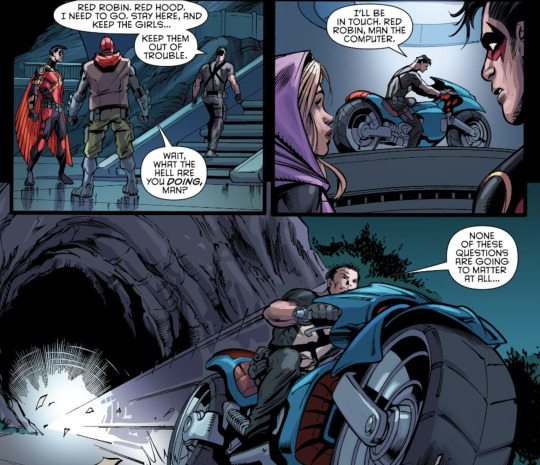

While leaving the rest of the family in the dark to avoid raising suspicions, he goes to get some answers.
Of course he would never betray his family's trust without some evidence.


While Jason and Stephanie are busy yelling at each other, Tim quietly sneaks away to answer a call by "Mother." Dick is at the Drake's while this is happening thus indicating that both Dick and Tim have their own share of secrets and battle plans.

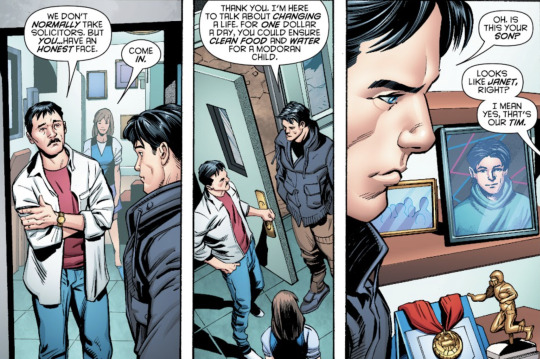
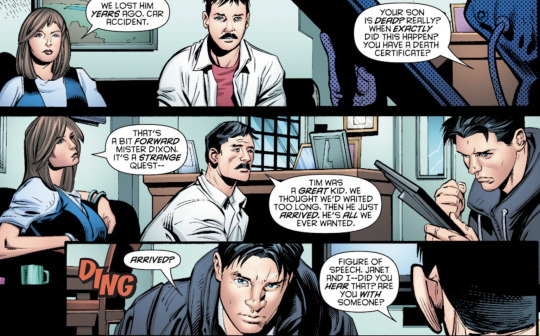
He asks questions about Tim to his parents as if he's never met Tim before. Someone should get this man an Oscar.
Of course everything goes to hell when an operative of Mother's shows up and starts firing at Dick. Tim's mom utters a codeword that isolates her and Jack and also notifies Tim. Dick neutralizes his opponent.

And then Tim shows up.
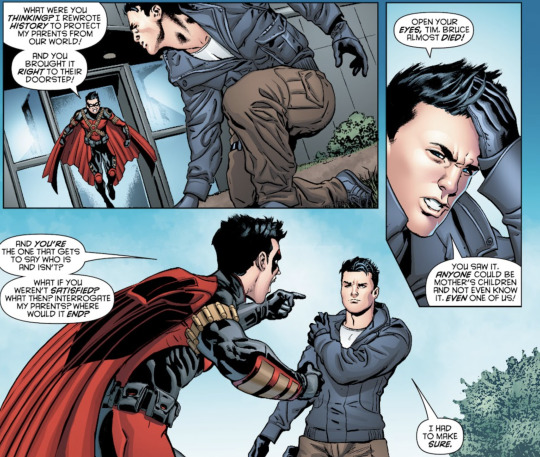

"It's your secrets, Tim. I respected your privacy. Never looked too close, until that became a luxury I couldn't afford...I thought you weren't one of Mother's children. Hoped you weren't. But I had to know."

While Tim is rightfully hurt, but the thing is-they can't trust anyone right now because Mother, their enemy, is inseparable from the batfamily. She gets into people's heads and uses them as operatives over their entire lifetimes from childhood to adulthood. And first and foremost, Dick is a detective. It's ingrained into him to identify any threat and act accordingly.
This scene is extremely important because Bruce was almost killed by Mother and Dick loves Bruce. For his part Bruce almost killed their world just so Dick could live and reversely, Dick would do anything to make sure Bruce was safe.
But here's where Dick's manipulation and cheerful demeanor come into play. The batfamily has no idea how good Dick is at manipulating people.
When Dick runs off to do this, they only say

They have no idea.
Dick never does anything without a plan, a backup, and a safety net. The only mistake in their understanding is that while they think that Dick looks for a safety net second, they don't know that Dick's already created his own net and the one they see is the one Dick tossed out to his allies when he needs them to catch him.
Even now, Tim only found out because his mom activated the alarms in his house. If Dick's enemy hadn't blasted in and opened fire at him then it's suffice to say that everyone would be none the wiser about his little side quest.
I don't think the batfamily will ever realize how cunning he is. They see him as a kind older brother who is too adherent to Bruce's rules. Afterwards Jason makes fun of Tim in an older brother way by implying if he's mad at his mommy lol.
The DC vs Vampires and why every single member of the family was blindsided was because they underestimated him and never expected it of him. That's how good of a manipulator Dick is and that is why they will never know.
Tim once said Dick was "ranting and raving" in Arkham during Future State but for someone who had supposedly lost his mind, he still was the reason they defeated the government and came out on top. Future State: Nightwing is a peak example of Dick's genius when it comes to controlling people even if it seems like lunacy from the outside.
Everyone sees him as the nice one and Dick is the nice one of the family but when his family's life comes into danger he will unearth any secrets that he let you have in order to keep them safe.
So basically he'll let you do anything: keep secrets, lie to him, ignore him, but if you endanger his family he is coming for you because as the song lyrics goes-
"I may be next to you but you don't know I'm undercover."
And that is what makes his character so excellent. The greatest spy and threat the good has ever had.
This is my favorite personality trait of his because he's the James Bond and Mata Hari of DC.
#everyone wants a piece of him but they will never know him#asks#manipulative dick grayson#cl paladin of nerd fandom65 asks#cl asks#thanks for the ask!
302 notes
·
View notes
Text
I remember a post where someone said that Batman isn’t adopting orphans to turn them from children into vigilantes so they’ll end up like him (a hero), but that he’s adopting orphans to turn them from vigilantes into children so they’ll end up like him (not a villain). I think the point was that most of the Batkids were already on a path that could potentially lead to crime and villainy by the time Bruce got to them, so taking them under his wing and mentoring them kept them from losing their way. Can’t find the post again, but I feel like reprocessing it by rephrasing it for myself.
You can’t make choices for people, but people have to have the choice in the first place. If you don’t have the resources and the support to harness your pain and suffering and channel it into something productive and honorable, it has the potential to become something much worse. If you don’t have the means to heal, then healing isn’t going to happen. In the case of Gotham, ‘something much worse’ appears to happen on a semi-regular basis and results in a new member joining Gotham’s Rogue gallery.
I’m a firm believer that once Bruce realized the best way to keep crime down was to intercept the would-be-Rogues before they arrived at the point of violence, Wayne Enterprises started pouring as much into Gotham’s welfare and societal infrastructure as waynely possible. The existing Rogue gallery is kept at bay through cooperation with Gotham PD, trying and failing to make Arkham Asylum effective, and being the Batman. They will die, not by Batman’s hand but one way or another, eventually. What if Bruce could starve out the violence and the crime? What if those who made their choice and refuse to change their ways bear the consequences of their actions, grow old, and no one picks up the slack behind them? What if people see that, BECAUSE Batman refuses to kill and forces the villains to face the music rather than escape through a quick death, villainy isn’t the answer and doesn’t fix anything? All villainy earns you is a punch in the face and a trip to jail or an understaffed asylum. If you want your life to get better, you have to find another way because crime clearly won’t work. Sure, this would never deter everyone, but it might bring the numbers down just enough to make a difference.
And then Bruce finds these kids. Kids who are alone or hurt or stubborn or scared and for one reason or another, Al even at their young age, they’re already at risk of choosing the route of villainy. They have the reasons, they have the motivation, they have the skill. Bruce looks around and sees that no one else is stepping up to intervene.
So he redirects them. He establishes himself as their primary authority figure (just as Alfred did for him, whether he had the same mentality as Bruce or not) and lays the no-killing rule on thick. He trains them and makes them better than the villains that already are and the villains that will be and the villains they might have become without him. He gives them a place to call home, if they so choose. He lets them be kids, he lets them be HIS kids, and slowly the family builds over time. He gives them a choice to reject villainy and he makes it enticing. He makes heroism look a little more fun, he makes it seem a little bit easier, and he makes them a little bit braver.
They make their own choices. Not all of them adhere to the no-killing rule the way Bruce does. Not all of them stay home and dwell in Wayne Manor full time. Not all of them even stay in Gotham.
But they don’t become villains. With very few exceptions, the Batman rarely stands against his kids. Whatever they are, it’s miles away from what they might have been without Bruce. It made a difference. The danger Bruce saw when he met each kid did not come to pass.
21 notes
·
View notes
Text
basically i dislike batman: the chalice because it demonstrates a poor understanding of both the real life history of the grail (well, "real"... as we all know i am adamant in the belief that no such vessel ever existed, or if it did then it has not been preserved), and a poor understanding of arthurian canon... though since it alleges that the waynes are descended from sir gawain, the 2nd one is wayy more important.
it also posits possessing the grail as "cool", when... i don't think it is? like, in order to be worthy of it you have to heavily adhere to medieval codes of chivalry (which are of course incredibly christian), and doing that in the modern day is just lame. actually it's not just the medieval chivalric codes--you have to be christian to a truly ridiculous degree. these days that's not really seen as admirable, just stuffy at best
(though to be clear i'm not complaining. i like modern rules of politeness just fine.)
it's also just disrespectful tbh. like why is batman a grailkeeper when he's barely even christian*
(*i know he's nebulously jewish but afaik he himself has never been portrayed in canon as jewish despite participating in christian traditions such as christmas many many times. also, this was published before that)
10 notes
·
View notes
Text
Thoughts on The Penguin So Far
Since a couple of anons wanted to know my thoughts on The Penguin as someone who isn't into comics/doesn't read the comics or watch the animated series or knows anything about canon, here they are:
The Penguin is certainly better than The Batman mostly because Colin and Cristin can act, which ... if not makes me emotionally invested in their characters, it at least makes them watchable because I don't find the actual plot or that much of the script super engaging, it's actually quite typical and feels kind of like the storyline you would find in a formulaic B-list mob movie or show but Colin and Cristin's performances elevate that and Rhenzy Feliz is solid.
I am having trouble with Vic's character just because it all seems to be happening way too quickly, like on the one hand, you watched your parents die, like, a week or two weeks ago and seem pretty well-adjusted (and so did his girlfriend) save for one panic attack in a club, on the other hand, you were a straight-laced kid with a loving family before this happened, mentioning you want more in a one-off conversation with your dad before he dies doesn't really sell me on his descent and him choosing to follow in Oz's footsteps rather than run away to California with Gabriela or even him and his friends trying to steal rims, like I don't see how we got here. If the point is that the city has abandoned them and it's chaos and nihilism after the events of the Riddler and so he's kind of like fuck it and just started down this path that Oz takes him fully down, a) I think it needs to be more than a couple of weeks to have passed b) I need to see that more in Gotham.
Like I sort of posted earlier, I do wish Gotham was more of a character in this, I wish I didn't feel like I was just watching a nondescript city that could be any major city, I want to see the weirdness and chaos and scumminess of Gotham.
For Sofia's backstory and what happened in Arkham, I get it, but it's a storyline like this where I have issues with when shows/movies decide to ground the comics in a sort of "realism" because if I go with comic book logic, if I go with the zaniness and the unhinged energy of the 90s Batman movies for instance



Sofia's dad sending her to Arkham for 10 years as punishment for talking to a reporter, not even actually going through with ratting him out to one, and the one-dimensional doctor putting her through electroshock therapy and creating circumstances for her to harm another inmate to keep her locked inside, done in a way that lacks nuance, I'm going to go with it, yes, that is absolutely what happened, sure.
But with the grounded "realist" tone of the show, it makes it hard for me to suspend my disbelief because I expect the show to treat this development and treat this story the way a regular drama would and therefore expect more time given to the circumstances, to Sofia's time inside, to what happened behind the scenes with her father and the judge and the doctors, I expect it to be treated seriously and it's not quite treated seriously in the show, it's treated like it's adhering to the conventions of comic/superhero rules.
For the most part, I find Oz's motivations and him wanting to run things and wanting respect and not wanting to be laughed at, and kind of playing the compliant fool to be well-executed if not fairly pedestrian but every once in a while there's a line or exchange in an episode that sells the poignancy and disrespect in emotionally effective ways like when Sofia asks Oz "what are you doing inside?" and Colin plays Oz's response with such subtlety but very effectively. I wish we had more of those types of moments.
All in all, it's not a bad time, and I'll continue to watch.
5 notes
·
View notes
Note
Why does fandom insist that robin exists to be the light to Batman’s darkness and to remind Batman keep his no kill rule because Batman is robins mentor and robin is supposed to learn from Batman that there are better ways than to kill people
(Dick: wants to kill mob guy idk his name
Jason: street kid with such a big chip on his shoulder that he tire-iorns Batman
Tim: outlier exists to force Batman to actually cope with his grief but was lonely I guess
Damian: raised by assassins and forced to do unspeakable things)
Batman should not need the presence of a child to adhere to his own moral code
I mean sadly fandom will sometimes insist* on it because it is one of the canon interpretations (link). it's an incredibly boring interpretation that I don't like, but it was pushed heavily when Tim was becoming Robin, and he was like THE Robin for many people.
I think that most of the Robins who want revenge (Dick, post crisis Jason) are not really like thinking killing people is the best way to solve their problems, it's more of born of grief and anger. My preferred interpretation is that Bruce taking them in helps them become not like him, and get past their grief, which I think is the superior version.
*tho i more of see it in fandom from people who don't like it but blame bruce for it, b/c IG he controls the meta narratives of DC comics XD
15 notes
·
View notes
Text
ok ive already listed why scapegrace is a narcissist but now im gonna explain why he has ADHD as well. will update as time goes on
1. clumsy & unbalanced. always running into shit and tripping and falling over. she literally cannot stop falling backwards over chairs istg. (also the sentence from mortal coil "Scapegrace forgot how to walk like normal people." that's iconic. me too bestie)
2. short attention span. he switches tracks on what kind of person he wants to be at least four times throughout the series. impossible to pick an ambition and just stick to it especially if he doesn't nail it the first time
3. he's creative!! as evidenced by the implication that he made the paintings in the torment's cellar, and his interest in not just killing, but killing to create awesome art. also i'm pretty sure he made his and thrasher's vigilante masks himself based on the fact that stephanie thought they were shitty masks💀
4a. sucks at making and keeping friends. her earliest recorded group of friends took advantage of her & then tried to kill her. when she tried to join the revenger's club she didn't try to engage with anyone (and was said to be surprised when someone actually did try to have a conversation with her). in her first interaction with thrasher she called him stupid and smacked him around and then offered a ride to a perceived crazy girl (clarabelle) within five minutes of knowing her. she only managed to become kind-of friends with valkyrie and skulduggery because she decided they were friends now and valkyrie decided it wasn't worth the effort to argue. girly does not know how to be social which brings me to point
4b. poor social skills. he just doesn't seem to fully understand or have the capability to adhere to traditional social rules. he overshares; half of his interactions in playing with fire were people telling him to shut the fuck up because he wouldn't stop talking about himself. he doesn't know how to read the room; he thought the torment would protect him from skulduggery (he didn't), he approached valkyrie as if she actively had some special agenda against him (she didn't, really), and he referred to people who didn't like him as friends (related to 4a as well). he doesn't know what's going on like ever
5. he has a journal
6. he's not a fast thinker when the situation demands it. he's a lil scatterbrained all the time, but in moments of stress his brain is EMPTY. please dont put him on the spot he will DIE
7. a lot of what she does is influenced by media and pop culture like we all know when she decided to be the dark and stormy knight she was thinking of batman and the concept of a zombie king is prevalent in horror media. and how could we forget slasher crasher dasher and basher. she is always trying so hard to fit into character archetypes
8. she sleeps weird
14 notes
·
View notes
Text
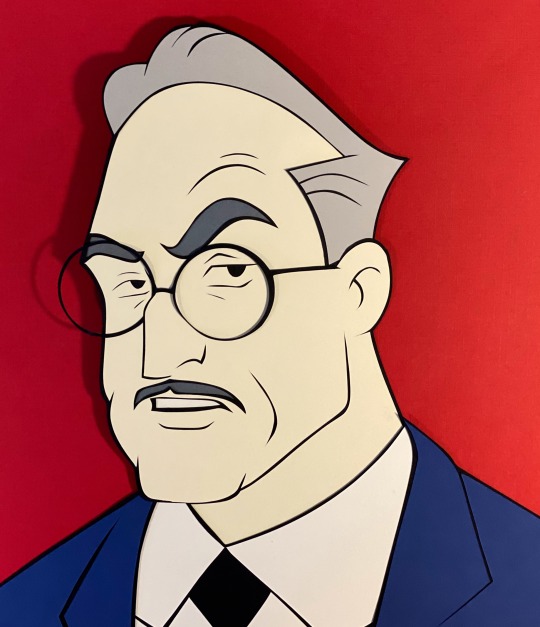
Batman: The Animated Series - Paper Cut-Out Portraits and Profiles
Mayor Hill
Hamilton Hill was a successful lawyer in private practice before running for public office. He initially won a position of Councilman and gradually matriculated through the ranks and was eventually elected Mayor of Gotham City.
One of his first acts as mayor was promoting the construction of Stonegate Penitentiary under D.A. Harvey Dent's request, with help of Bruce Wayne and the Wayne Foundation. Early in his tenure as mayor, Hill was highly critical of The Batman, going so far as to assembling a task force to take down the Dark Knight led by Detective Harvey Bullock. Although Hill’s attitudes toward the hero mellowed after his son Jonah was rescued by Batman.
During his time on the city council, Hill was associated with Temple Fugate, who ran an efficiency consultancy that contracted with the city. Hill recommended that Fugate learn to relax and not adhere to such a staunch personal schedule. Fuguate would go on to blame Hill’s advice for his being late to a ruling that resulted in the bankrupting of his company. Years later, when Hill was running for his second term as mayor, Fugate resurfaced as the villain known as The Clock King. Herein, Fugate attempted to humiliate and murder Hill. Fortunately the mayor was saved by Batman.
Hill was one of the city luminaries abducted and replaced by a robotic duplicate by HARDAC. He was also kidnapped by the villainous Lockup who felt Hill was too lenient on crime. Some time thereafter, Hill was held captive by The Joker who threatened to blow up the city with a nuclear bomb. On all of these occasions, Hill was saved by Batman.
Actor Lloyd Bochner provided the voice for Mayor Hill with the character first appearing in the second episode of the first season of Batman: The Animated Series, ‘On Leather Wings.’
4 notes
·
View notes
Text

bruce breaks his no-kill rule once--exactly once.
when jason ran away to try and find his birth mother, embarking on a journey that would take him far from the safety of wayne manor, bruce dedicated all of his time, resources, and energy into finding him. he did not care about punishing the boy for his recklessness, or even necessarily dragging him home. he cared for his safety, his wellbeing, and ensuring that this fool's journey would not end in the worst.
but it did.
bruce was always two steps behind. whether it was arriving at a location days after jason, or even arriving too soon and missing him, it was not up until the final hours of rushing to the last destination that finally, finally he seemed on the cusp of reaching jason.
but he's seconds too late.
the warehouse jason and his mother were hidden away in exploded just as he approached, watching dark plumes of red-hot smoke curl up into the sky with the last hope of getting to jason. still, bruce puts his own wellbeing aside to try and find jason, try to save him. jason's burnt body was what finally drove it home--he failed. he had hand-led this boy to his death was what bruce convinced himself of, and as jason's dying mother, sheila, told him with her dying breath that it had been the joker, and how jason had tried to save them both, his grief and self-hatred warped into a new goal.
both sheila and jason were taken to gotham for formal burials, mother and son finally reunited.
while burying his second son, bruce came back colder, more withdrawn. not even alfred could pry what was on his mind out of him, and dick grayson was similarly at a loss when returning to gotham for the funeral. bruce knew what he needed to do, but it would an act that defiled the very image he had cultivated for himself, and set him down a slippery slope he did not know if he could climb back up from.
every criminal bruce encountered was given the same, equal chance of redemption, and he had even seen it, witnessed with his own eyes how even the worst of villains could turn their lives around. yet, those same eyes had been closed until jason's death, and he realized now with renewed vision that he had been failing gotham, and his own family, by not doing what ultimately needed to be done.
two months after jason's funeral, batman and the joker met for one final dance, with only one of them aware that it would be their last.
unto the joker does bruce give back to him what he had done to jason. no one comes to stop him--if anyone was aware, they simply turned the other way, choosing blindness over judgment of bruce's decision.
gotham police would be alerted to the latest, and last, warehouse under the joker's control when it erupted into a volcanic fireball of flame. witnesses cite hearing laughter early in the night, and minutes prior to the explosion, some claim for the laughter to have transformed into pleas--like the voice had never foreseen the possibility of what was to happen coming.
the joker's burnt corpse was found tied, every warehouse door locked and secured with heavy duty padlocks. the angle of his body indicated he had attempted to drag himself to the closest door, his burnt fingers showing faint traces of blood beneath split nails trying desperately to undo his ties.
no one ever could figure out who had done it. the batman was known for his strict adherence to a no-killing policy, and it was eventually decided that some ally of joker had turned on him due to a disagreement. those few who could figure it out kept their lips sealed, as the loss of the joker to gotham was a blessing.
bruce didn't find peace, but he hoped that jason and his mother could both rest knowing he did not allow his own shortcomings to fail them again.
1 note
·
View note
Text
Some random unserious thoughts about this idea (straying kinda far from the plot of conclave but whatever):
> In Bruce's will, he tells Dick that he has to gather the extended team and lock them all up together until they decide on a new Batman
> Bruce does not leave his original will for Jason, instead he sends him a message about how he wants him in the "conclave", basically Jason sees the symbol of the bat as his tie and desire to be in the family and Bruce wants to use and the confrontation to what the symbol means for others to ensure Jason adheres to the bat code of conduct post-mortem. Jason spends the whole time struggling with how to handle his grief in this new context.
> everybody looks to Dick as the new batman and he's like fuck that shit and they're like "if the majority says so you got no choice"
> Cass arrives last minute and it's revealed that she was considered by Batman as a potential candidate, and everything is twisted by the thought that it doesn't need to be a Batman so much as an incarnation of the symbol of the bat (Batman wanted her to be Batman, but Steph argue that Cass shouldn't have to pretend to be something she's not and it should be her choice if she's Batman or The Bat)
> It's argued that if Cass is considered then so should Helena and Kate, which sparks debate on a Batman without a no-kill rule (esp when Jason gives helena or kate (haven't decided) his vote)
> Azrael tries to gauge the best candidate by stabbing people with his sword
> Cass thinks she shouldn't be The Bat because she's a killer
> Dick is torn because he thinks he's the only possible choice but it will destroy him- up until someone (Helena?) knocks him out of his martyr complex
> Damian is struggling with the idea that as the heir to the Bat he should become Batman but also he knows that he's too young for it and
> Dick, assisted by Barbara. Is focused on figuring out who has become evil/gun batman in some versions of the future, disqualifying Tim (amongst others if i'm not mistaken)
> Despite a lot of support, Cass doesn't think she should be the Bat because she's a killer
> Again, they're all locked together in the same place (a "safehouse" that's another, creepier manor) by technology until they can get a majority vote, with only Oracle outside sometimes popping in via computer to give them the shade on everything
> Duke ends up giving a big speech about how actually Robin doesn't need a Batman and they already have a Bat: they have a Black Bat, and a Batwoman, and a Batwing, and a a Batgirl. They also have all those other vigilantes, nightwing and robin and spoiler and huntress and azrael and signal and red hood who are all fighting together and maybe Gotham doesn't need a godly protector watching from above as the symbol devours the person. He is then struck by a vision that Bruce is alive, but doesn't tell anyone in hopes to see what decision they come to.
> In the end, it comes to Cass VS Dick. They end up voting for Cass, but with a majority of abstinence after Duke's speech. (They literally vote on a fingerprint machine that grants access to a a batsuit-associated gauntlet that allows the person wearing it to open the door). Dick helps Cass put on the cowl and gauntlet in front of everyone.
> the door opens, finally letting golden light in the dark room. Cass walks out and she's just a black, creature-y silhouette against the bright yellow light, and she walks into the night until she disappears in the darkness. The light from the open door reflects on Duke's face as he watches her go.
Battle for the Cowl AU but it's the plot of Conclave
35 notes
·
View notes
Text
Ok so I’m reading Titans Tower AUs where Jason goes ‘kill the Replacement’ straight to ‘must protecc the child’ real quick (those are the best) and I just read the part of the dialogue where Tim tells Jason that he’s been cleaning up Gotham ‘the easy way’ in reference to how the Red Hood is a killer
And now I’m thinking of this piece of dialogue in a new light because, what if Tim Meant that literally like “have you ever had to disembowel someone with just a spoon???? No, you use guns to kill people and actual knives to decapitate their heads instead, you noob. Only real killers know how to decapitate someone with a pencil and let me tell you that it’s harder than it seems”
Meanwhile Jason is all offended because did Robin, the one who follows Batman’s no kill rule, just criticize him on how he kills people instead of criticizing him for, you know, actually Killing people???
I can just imagine this conversation is going on in the kitchen of Titans Tower with Tim in his pajamas and Jason in full Red Hood gear in the doorway because this was supposed to be an ambush but now he’s actually kinda offended because of course he could kill someone with a spoon and threatens Tim again only for Tim to flip that Uno Reverse card and literally arm himself with a spoon, brandishing it in front of himself like it’s a knife, and just going like ‘bitch I’m not Robin right now so let’s go, I’ve been a little out of practice and it’s so nice of you to offer to be my next victim’ with a little creepy grin on his face and suddenly Jason feels the embodiment of the meme: *nervous laughter* “what the fuck”
Somehow, Tim manages to pry Hood’s helmet open with the goddamned spoon and hey, Jason should really buy some silverware like that and he’s half tempted to ask Tim where he bought it from, and damn who knew a spoon would be such an effective weapon and oh my god this kid is actually crazy why does he know how to use a spoon as a weapon Jason better not go out via spoon now that’s just embarrassing; at this point there would be no life threatening injuries on either one of them, though Jason did manage to cut the kid’s throat at some point and got a spoon to the shoulder for his troubles but now they’re both tired, the Pit of Green Juice is quiet in the back of Jason’s head and ok, maybe he can, begrudgingly, admit to being impressed at how well Tim can fight with a spoon but it’s mostly just concern as to why he knows how to fight with a spoon and Tim is just like ‘Look Jason, yes I know, don’t look at me like that, just, let’s call it a truce and go patch up because I don’t want to kill you but I will have no problem strangling you with your own intestines if you keep trying to kill me ok? Ok’ and at this point Jason really doesn’t think the kid’s joking all that much so he agrees to the truce between them (let’s face it, having the Big Bad Red Hood get taken out via spoon would just be so embarrassing that Jason wouldn’t find peace even in death)
And it’s not until they’re both patched up that Jason decides it’s safe enough to ask about why Tim said that he’s not Robin right now (there’s no more spoon in Tim’s hands but he’s still on alert because the kid is just insane enough to try and bite him); and Tim’s like “uh, yeah I follow B’s moral code as Robin but I’m not particularly attached to it? Like, it’s not my moral code, whatever that is, and I’m not actually part of the family so just think of me as more of a close coworker? Anyway, I am and will always be a Drake, my family motto is literally ‘May Our Enemies Choke on Their Blood While Our Hands Remain Clean’ so you can get a picture of how I grew up, and to answer your questions, yes I have killed people, no I don’t really regret it, they were really bad people, yes i will throw hands again, no the Bats have no idea, and yes I have had to decapitate someone with just a pencil and disemboweled someone with a spoon, so yes I am actually qualified to complain about how easy you people with guns and knives have it when it comes to killing people because I would’ve loved to have had at least a pocket knife back then, hell I would’ve taken a sharp icicle but no, the only thing available was a pencil so I had to make do, also no, I really don’t want to kill you, I actually like you but please stop coming after me and we can just meet up to kill some of the more evil Rogues sometimes, we can even make it look like an accident”
Jason is just so Shooketh at this point that he will just focus on the last sentence for now because he doesn’t have the brain power to battle through that dump of information right now so he’s like ‘what would you know about setting up accidents Timbit’ cue Tim being like ‘well, it wouldn’t be all that hard to just mislabel a few chemicals in Joker’s newest hideout and have him blow himself up while trying to make a batch of Joker Gas, a sort of poetic justice when you think about it’
Basically, an AU where Tim wasn’t trained by Bruce first so he has a different moral code (whatever it is) and has been in just enough crazy situations to warrant his bizarre skills with a spoon
#new AU#tim drake#is basically also a killer#but not while he’s Robin#that’s when he adheres to Batman’s rule#because Robin is a symbol and it shouldn’t be tainted#and then Jason comes back#and ambushes Tim at Titans Tower#but Tim isn’t Robin at that moment#so he doesn’t hold back from fighting Jason#in his pajamas#while having his weapon be a spoon#because his life has been a series of bizarre events where he has had to disembowel someone with a spoon#Jason and Tim come to a sort of truce#and Jason is basically the embodiment of the meme: *nervous laughter* what the fuck#he also kinda wants to ask where Tim buys the silverware because that’s one resilient spoon you stabbed me with#basically Tim and Jason being the murder birbs when Tim isn’t Robin#but of course the Bats don’t really know about that side of Tim’s life#and he’s trying to keep it that way#and now only Jason knows just a little of what’s going on#but like#he isn’t a snitch so it’s fine#and he also doesn’t want to find out what it’s like to be taken out via spoon#which is just something so embarrassing that he wouldn’t be able to find peace in the grave#so Tim and Jason have a bonding moment#and decide to kill the Joker#but make it an accident#and then they do#batfam#bruce wayne
105 notes
·
View notes
Text
Relationship Compromise in Batman/Catwoman
(or: I'm not sure Tom King knows just how bonkers what he wrote is and I don't know what to do with that)
Batman/Catwoman concluded this past June, and I did not enjoy it, and it haunts me.
Just... when I read a story and what the author apparently thinks is happening does not align with the events on the page, I can't help but feel some fascination. The final page, in B/C #12, is definitely the most dissonant:

What a romantic scene, the pin on a tale of love triumphant! If you ignore many of the events around it!!
I try not to be too much of a dick even about things I don't like. Regardless of my opinion, Tom King wrote twelve dang issues interweaving three different time periods, so he put some measure of thought into it. So at the conclusion of my first read, when my reaction was "lol what," I still thought maybe the spliced time periods were hiding something from me. That narrative tactic is typically used so that an event that happens in one period of time can directly comment on an event that occurs much earlier/later, and there was some of that in B/C, but its main effect was muddling the story. Plus I read it over the course of 17 months! Maybe I missed something, something that made it allllll come together.
So during my second read, like a sane person, I cut up all the panels and sorted them into the three different tracks. And then I read the story again chronologically, and this time my reaction was... *resoundlingly* "lol what."
And I will explain why at length under the cut (with many many spoilers, as well as remarks on dismemberment and suicide).

(A more fitting final takeaway from much earlier in the story, B/C #3)
Ostensibly, Batman/Catwoman is about Selina keeping an identity of her own while making her relationship with Bruce work; it's about compromise, about love persevering through conflict. Yet again and again, whether I read the story the way it was published or chronologically (for a total of five times!), I kept seeing Selina so bitter about those compromises that, to keep the relationship going, she tells Bruce two brutal lies that make the final page of B/C come off as a joke.
Again, it's this dissonance that bothers me. I ship batjokes. If you want to tell me a tale about screwed up relationship dynamics and people managing to love each other in spite of them in their own bizarre way, I'm into it. That's interesting! A lot of B/C was interesting, until the framing kept trying to tell me it was ultimately a love story that all worked out.
This journey of Selina's, which is as much about her relationship with Joker as it is her relationship with Bruce, takes place over three different Christmas seasons. Presumably this is a reference to the Ghosts of Christmas Past, Present, and Future, so I'll use those labels:
Past Track: In their earlier years, Bruce and Selina attempt a relationship while Selina tries to hide that she's drinking buddies with Joker. Present Track: Years later, some point after King's Batman run, Bruce and Selina's relationship has progressed to them living together, with Selina helping Bruce fight crime. Andrea Beaumont reappears in Gotham and asks them to help search for her lost son, and she goes on a murderous revenge spree when it appears that Joker killed him. Future Track: Decades later, Bruce dies of sickness in his old age, and the widowed Selina tracks down Joker and finally kills him. Helena/Batwoman (her and Bruce's daughter) and Commissioner Dick Grayson attempt to bring Selina to justice.
(These descriptions just set the scene for each time period. The plot gets too convoluted to sum up, so you'll have to read B/C if you want all the story beats. Godspeed.)
Selina's first big lie is actually pretty understandable. It comes up early in B/C #2 in the Future Track, when she slashes Joker's throat.
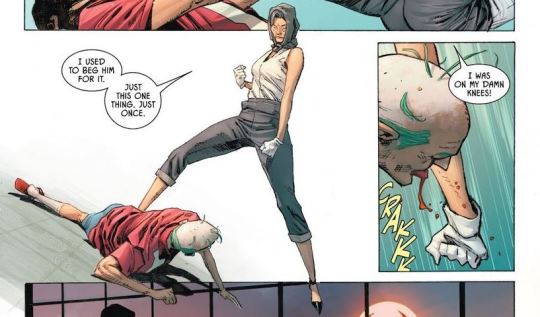

Bruce's refusal to kill including Joker is an oft-voiced frustration not only in fandom but within the comic universe. It's clear here that Selina agreed to adhere to this rule while Bruce was alive. Then she, as his wife, when he was on his deathbed, lied to him about one of the major principles of his life.
Certainly, what to say to Bruce about her intentions must have been a tough call. As he slipped away, Selina could have either lied to his face or told him that she was going back on her word. Both are not great for different reasons! Of course, she had a third choice, which was honoring Bruce's wishes, perhaps having come to see eye-to-eye with him over the years, the kind of understanding you might expect in a story that ends with a kiss that belongs on the cover of a bodice-ripper. But the crux of B/C is that Selina did not agree with Bruce on this, and over the next ten issues we learn more about why, after Joker has apparently been untraceable for ten years, she felt the need to hunt him down.
Plus it's not like Joker doesn't have a point; it is kind of darkly, desperately funny for Bruce to expect loved ones to stick to his rules after he's dead, like they're appendages of him instead of their own people. Even when Bruce was dying, he was trying to exert control. And this idea coming up so early, it feels like that is what B/C is supposed to be about: Selina's independence stifled by Bruce's need for control.
This conflict is starkest in the Past Track when, instead of trying to kill Joker, Selina repeated refuses to sell him out:
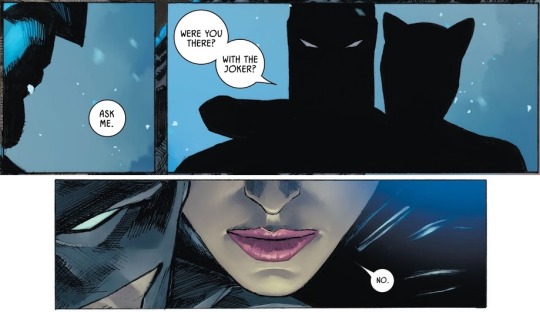
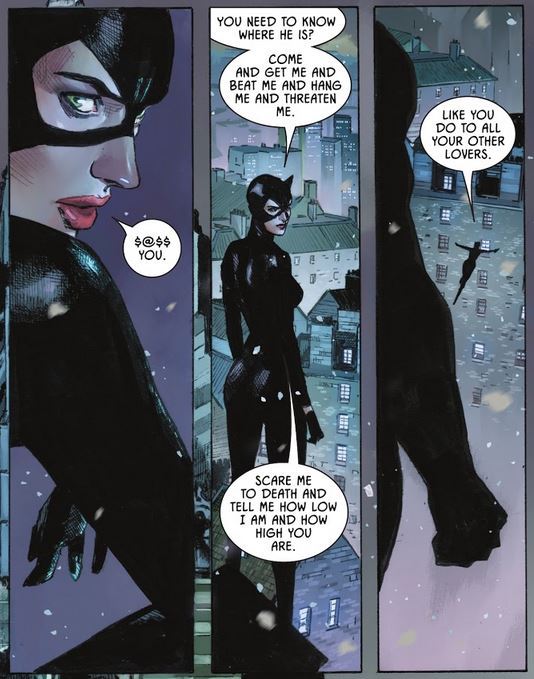
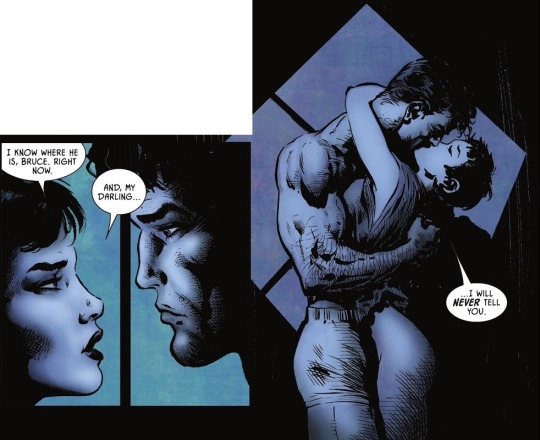
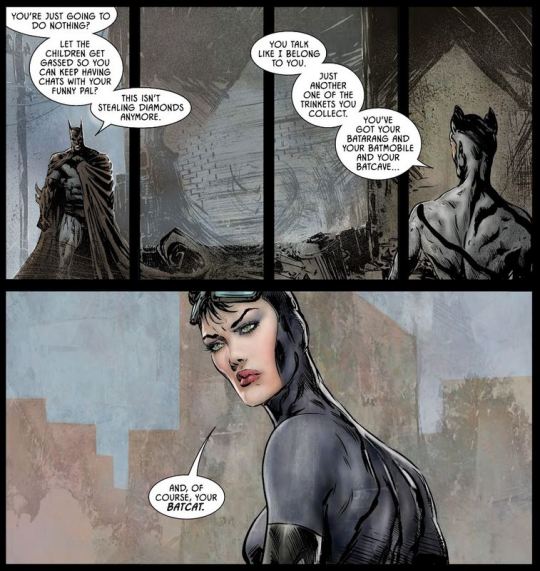
(Selina, people are dying.)
Naturally, Joker adds to the friction by encouraging Selina's identity crisis:
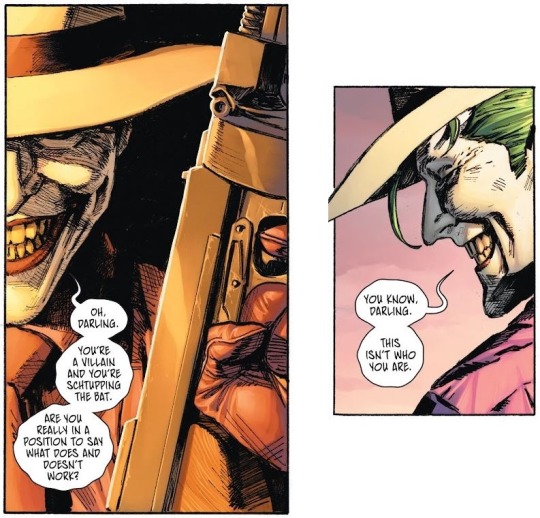

Of course he's saying these things because he's ultimately only "friends" with her in hopes she'll disclose Batman's identity and location to him.
And given Joker's behavior, it feels like Selina is only "friends" with him too, that her attachment is more about the freedom it represents for her, about her refusal to be consumed by Bruce— though it's still hard to buy. Joker's characterization remains the wildly murderous maniac he's been for ages now. I can see a tamer version of Joker charming his way into a friendship with Selina, but she's not the type of person to brush off mass murder while casually trusting the mass murderer. Even in this very story!

Previously, Selina assaults Joker because when he poisoned of one of her marks, it left evidence that the two of them were in the same room together, but here, she wasn't involved in the reindeer "gag." She's just upset.
Yet before and after those assaults, Selina and Joker still have their buddy time, so her perspective is summed up by what is one of my most hated panels ever in B/C #8:
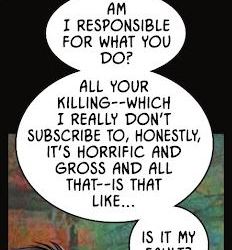
(Oh golly gee, who knew ignoring all this over-the-top murder stuff would feel ickily complicit!)
One way or another, Selina clearly doesn't like what Joker does, seeming to confirm that this friendship is really about her need for independence— until B/C #9, when Joker again asks for info on Bruce and it finally clicks for her that Joker's friendship is a fraud. Selina is just so shocked and appalled that this remorseless killer would betray her, that in B/C #10 the revelation escalates into a physical fight and speechifying:

(The fact that this never occurred to Selina until now is insulting to her character.)
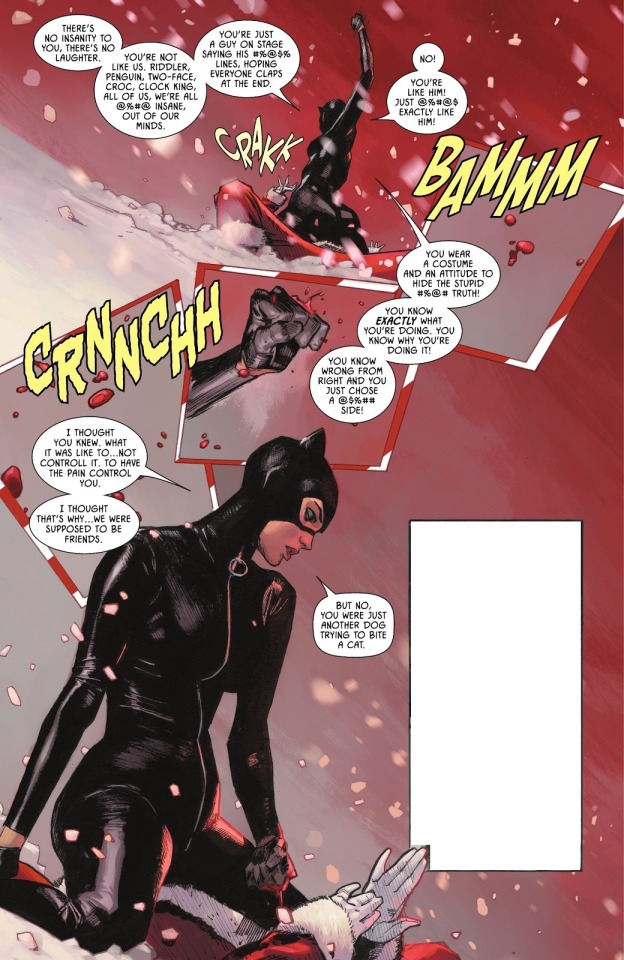
(I really hate her dialogue about the rogues' claims to insanity, but that's a whole other can of worms.)
The betrayal is all this fight is about. Selina is not protecting Bruce here; she's channeling a simultaneous frustration with Bruce. Selina is looking to be understood, and she's not finding that understanding. All she gets is Bruce asking where Joker is, and Joker asking who Bruce is. Therefore she decides: fuck both these guys.

You know what? Hell yeah! Go be your own person, Selina!
Uh, except the very next thing that happens in the Past Track, in B/C #11, is Selina turning around and giving Joker up to Bruce. I guess she meant "fuck" figuratively with Joker and literally with Bruce. Bruce asks her why she changed her mind, and she explains:
"He... Joker asked me if... If I was Batman or if I was Catwoman. Like... like everything in the world has to be this or that, one or the other. Like you can't just put the two together and make that work. [....] Also, he's the Joker. So @$%#% him."
Okay that actually explains jack shit, and you did not really "make that work" because this story references events in King's Batman run, which means you broke up again (probably several times) after this, but okie dokie.
So from the Past Track, we know that Joker violated Selina's trust, and she finds his murder gross. She did not try to kill him at that point, though; it's what happens in the Present Track that changes things. In that time period, presumably set some time after King's Batman run, Selina and Bruce are back together, and their conflict resurfaces when Andrea shows up. Andrea kidnaps Selina in an effort to get Bruce to turn Joker over for execution, and in a short time she convinces Selina that Joker deserves death for his brand of cruelty. The two women then conspire to get Bruce out of the way for the murder by knocking him unconscious and locking him naked in a bank vault with the alarm going off. Which is 1) hilarious, sure, but 2) giving strong Joker vibes?

(Some people theorize that Tom King is secretly a batjokes shipper. My theory is that he doesn't know he's batjokes shipper.)
I'm not saying Selina can't be funny; I'm saying that out of all the options she had to get Bruce out of the way, this is what she picked, while leaving a breezy btw-gonna-murder-now note. And this is far from the first time she has a Jokery flavor. The most egregious example is in the Future Track, when she discovers that Dick had Joker's body transported to Gotham, and she dismembers Joker's corpse and uses the pieces to decorate a tree:

(And a clown head on a fir treeeeeeee!)
Dick's dialogue is repeating a note left on the tree, which is referencing a joke relayed to Selina and Batman by a Joker victim in the Present Track: "what did Santa say when he got thrown down the chimney and landed on his head? Oh oh oh." But the problem with this grotesque display is that Joker can't experience the payback since he's, uh, dead, and Selina and Bruce were the only ones to hear this joke. I suppose Bruce may have told others about it, and certainly kept records about his cases, but still, why antagonize Helena and Dick with this specific line? Who is this for?
Allegedly, Selina is still just that angry about what Joker did to Andrea Beaumont, which feels inexplicable. The theory seems to be that Joker's manipulation of Andrea makes Selina feels a kinship with her. After the undefined version of Mask of the Phantasm that happened in this universe, Andrea hunted Joker down, only to find him with a baby that he referred to as his own child. To escape, Joker tossed the newborn into the air and ran off, and when she caught the baby... she found her inner pain suddenly soothed. (Yeah, yeah, I know.) Instead of continuing the hunt, Andrea named the baby Andrew (yeah, yeah, I know) and became his mother— and now all these years later, she finds out that Joker stole Andrew from a hospital, when the clown tricks her into coming with him to the family's home and blows them up. Andrea feels such horrible guilt about getting the entire family killed that she commits suicide right in front of Bruce and Selina.
An awful series of events... but I still find it strange for Andrea to be the only victim Selina name-checks in her final confrontation with Joker. She barely knew Andrea, a fact that's emphasized when Harley shows up. Selina has longer histories with other characters traumatized by Joker, but she doesn't say one word indicating that she killed him for Harley too. You could say it's because Selina's too focused on their fight, except she does find the mental space to declare that Harley never killed Joker because, like Bruce, Harley is a better person than she gives herself credit for.

(We've got two other cans of worms here we're not gonna open.)
Also, in the Present Track, Selina is strikingly callous toward the Joker victim who tells the Santa joke, when Selina and Bruce first encounter him...

... and when he falls off the bridge.

But okay, maybe on top of witnessing Andrea's suicide, it's the motherhood angle that gets to Selina. She doesn't seem too affected in the Present Track, but in the Future Track we see her interactions with Helena go from strained to violent, then come to a more loving resolution:
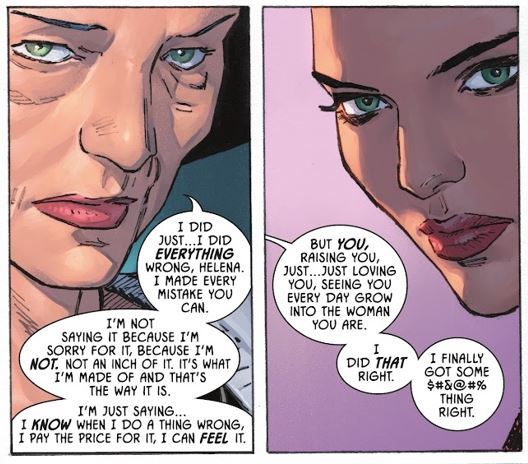
We can surmise that Selina's need to defy Bruce's rule and kill Joker only grew over time, as her relationship with her daughter deepened her understanding of Andrea's pain at losing Andrew.
Except LOL, SUCKERS. That interpretation is undermined by the pièce de résistance, the second and worst of the lies Selina tells.
Because, as revealed in the Future Track, Andrea is alive! Selina broke Clayface out of Arkham and got him to impersonate Andrea slashing her own throat so the real Andrea could run away and lay low. Andrea agreed to this in exchange for Selina eventually killing Joker. Selina has been planning to kill Joker for decades, since before Helena was born.
And, again, in case you forgot, the fake suicide happens right in front of Bruce by design, and there's no indication he ever finds out the truth. In the immediate aftermath, Selina even freaking brings up Alfred, adding to Bruce's feelings of failure and loss:

(These panels also featuring Bruce's glib, painfully out-of-character reference to his parents' murder.)
If that wasn't enough, Selina comforts Bruce by using this as an opportunity to reinforce that, in the end, all they have is each other:
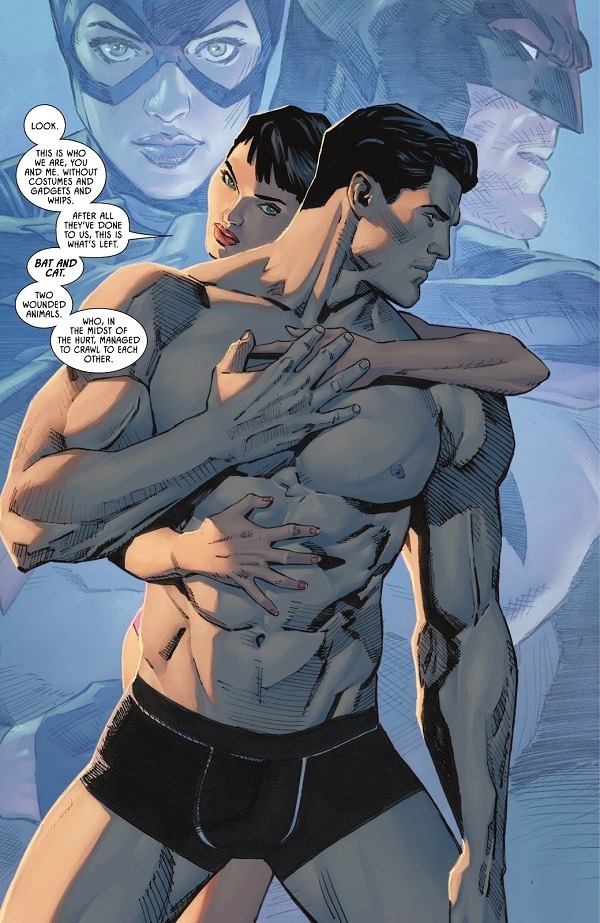
(Ummm so what if in this instance the cat wounded the bat but the bat didn't know? And is this a bonding moment or a Calvin Klein ad?)
These panels come before the reveal that Andrea is still alive, so the appeal to Selina and Bruce's connection is in earnest. It's only later in the issue that the reader is privy to how wildly fucked up this is! On Christmas!
And then it gets even worse, because now, now, is when Selina and Bruce finally get legitimately married. It's not clear if it's that same night, but it must be within a week because the chapel still has Christmas music in rotation. Selina has just finished plotting for Bruce to witness the fake-but-heartwrenching suicide of one of the loves of his life, and then she marries him!

(True love conquers all when you've manipulated your partner into another bout of grief.)
In the future, temporary fugitive Selina joins Andrea on a tropical island, and the fake suicide is framed like a clever ploy the women pulled off, a bizarre compromise to get around Bruce's rule, but it just shows... contempt, honestly? And not for the first time, after Selina's inexplicable refusal to tell Bruce Joker's location, after her angry realization that Bruce and Joker are so much alike, referenced again here:

There's also a strange vibe with something Selina says to Helena at dinner, after Joker's murder:


Very "I held out long enough to kill the clown and get all Bruce's money. :)"
Then there's Selina's relationship with Helena. Before the heartwarming scene between them I shared above, in B/C #10, they have a physical fight during which Selina expresses a lot of hostility toward her daughter for embodying Bruce's brand of justice.



That last one may seem irrelevant, but I think it speaks to the point. Calling your daughter ungrateful when she's doing what you know she was taught? Seems like there's anger at the teacher!
And when all is said and done, Selina convinces Helena to not be like her father and to let her mother walk:

Selina does also say favorable things about Bruce, and at times expresses regret that she couldn't live up to what he wanted. I'm not saying she didn't love him, or that holding off from killing Joker while Bruce was alive meant nothing. But as the saying goes, "show, don't tell," and so many of Selina's actions, especially loading more trauma on Bruce, outweigh the nicer moments.
In the face of those actions, the sweeping romance of that final panel in the last issue does not hold up. There's elements of a better story here, about an independent woman convincing herself to compromise for love, and at the end of her life finding more regret and bitterness than she bargained for, and not finding peace with it. But while King is able to see Selina's need to be unconstrained, ultimately his writing glosses over it and has her reconcile with the wife/mother role, while ignoring the cruelty of the deception she implements to get there.
Looking back, it feels like the primary function of telling Batman/Catwoman in such a tangled way was to obscure the mess.

(tl;dr: where is my "Selina divorces Bruce and takes him for all he's got" storyline?)
79 notes
·
View notes
Note
001 for Butchlander and 002 for Homie, because I love to be obvious!
Tackling them out of order.
002 | Homelander
* How I feel about this character:
I want to mush him and squeeze him and torture him and pet him and never let him out.
Oh and he’s a very interesting character and a joy to write. Somewhat as a result of the writer’s room, and somewhat as a result of Antony Starr’s acting.
* All the people I ship romantically with this character:
I’m a whore, I will read him having sex with just about anyone, and I could make a case for him getting romantic with many characters on the show. Top romantic (heh loaded word) ships are Butchlander, Homewell, Maevlander, Starlander.
* My non-romantic OTP for this character:
I honestly don’t know what this question means because all my ships are horny ones. But I wish we got more Black Noir being a father figure to him (I wish Noir had more to do in general before they decided to give him some background just before killing him off).
* My unpopular opinion about this character:
Hmmmm. I’m a little afraid that if Kripke writes him a “redemption arc” in the show they’ll botch it with some incoherent drivel à la s3e8 so I’d almost rather they just didn’t.
* One thing I wish would happen / had happened with this character in canon:
I have more than one.
I’d rather see him depowered and live than die at the end, somehow.
I would have liked to see more of him trying to parent Ryan with Becca around.
I kind of wish he hadn’t killed Stillwell but mostly because I thought she was a cool character.
I wish he hadn’t taken over Vought because that decreases the chance we’ll ever see him operate outside of it.
* my OTP:
Billy Butcher reprogramming HL with tough, but genuine, love. And sex, definitely lots of sex. [refer to section below for much more word vomit about them]
* my cross over ship:
Heh, I think Makima from Chainsaw Man has a nice parallel to the Homewell dynamic. I’d read Batman x HL, I feel like Batman could deal with his bullshit effectively.
* a headcanon fact:
Homelander prefers his sexual partner be strong and wield soft power over him.
============================
001 | Butchlander
* when I started shipping it if I did:
Because I was watching the show very rapidly, I didn’t start shipping it outright until S1E8, but if I had a week between each episode it probably would have materialized no later than E6.
* my thoughts:
Scorchingly, achingly hot. The show canon is stingy with their onscreen time together, but each scene they meet in is glorious. One of the reasons I’m willing to overlook the inconsistent writing in s3 is that they are ramping up the butchlander element in the show. I love that they have ended up sharing a child while both being utterly unequipped to parent. I don’t remember any other enemyslash pairing setting that up and it’s so damn fun.
* What makes me happy about them:
I like to imagine scenarios where their respective traumas and defects (I don’t think they’re “the same”, kripke) fit together in such a complementary way that they end up accidentally helping each other become a little more emotionally functional.
* What makes me sad about them:
One of them lost his wife because of the other and that is a hard wound to heal.
* things done in fanfic that annoys me:
I don’t like when Billy cries too much. I don’t like when writers go all out with Butcher’s cockney but it sounds like Dick van Dyke (easy to criticize, hard to adhere to this rule). I’m more tolerant of different HL characterizations because I think canon has shown us more variety from him in different scenarios, but I tend to enjoy it less when he’s written as a sadist monster with nary an indication of any other emotions.
* things I look for in fanfic:
Generally prefer Bottom the Homelander [not because he has a better ass, but] because the fic is more likely to characterize both of them in ways I find more IC. Generally like when they at least start out antagonistic and hating each other if it’s a multichapter. Love when there’s an element of coparenting Ryan involved. Love when it’s an E rated fuckfest because [I’m here for the porn canon won’t give us, and] they are both presented as characters with energetic libidos.
* Who I’d be comfortable them ending up with, if not each other:
Honestly? I feel like they’re both likely to end up alone, because I feel bad for whoever ends up with them if they’re not a strong person. Billy with Maeve, as alluded to in the Maevlander post seems fine endgame to me. Butchie is a big fat nope for me, not only because of Annie but because it gives me incest vibes since he sees him as a younger brother. Billy with some strong woman like Rainer probably works. Homelander… needs someone who can spank him if he gets out line. If Victoria Neuman can become that person remains TBD.
* My happily ever after for them:
Haha, I’ll take almost any iteration where they end up together and parent Ryan. I’m intrigued by Billy getting upgraded with Compound V and how they’d keep from becoming a terrible powercouple of supe cunts. I’m intrigued by HL getting depowered and Billy having to rehab him into being a functional human being out of that mental wreckage. I’m intrigued by them staying as human x supe, with both of them having a weird love hate relationship with being involved with a “race” they generally looked down on.
* who is the big spoon/little spoon:
Billy is the big spoon. I will only entertain the thought of HL being the big spoon if it’s written in Russian for reasons I can’t quite fathom and must have something to do with early childhood traumas 😂
* what is their favorite non-sexual activity:
They are pretty different people in terms of pastimes in canon. I named enjoying the outdoors in another meme. I’d like to think they’d also both enjoy having (or aspiring toward having) a normal family life, raising a child as if they’re normal, well-adjusted adult men, doing normal domestic things. Emphasis on the as if.
29 notes
·
View notes